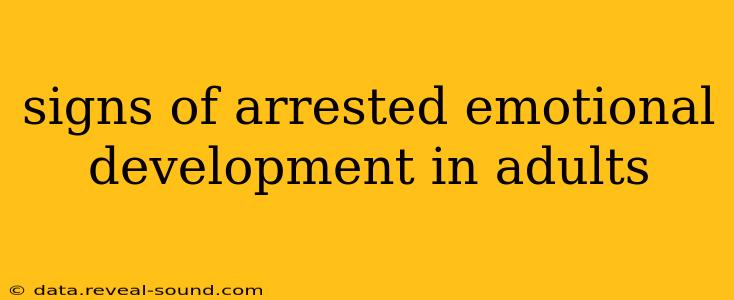Arrested emotional development, while not a formally recognized clinical diagnosis, describes adults who exhibit emotional patterns and behaviors typically seen in younger children. This isn't about childishness; it's about a stagnation in emotional growth, impacting relationships, work, and overall well-being. Recognizing these signs is crucial for personal growth and improved relationships. This article will explore key indicators, addressing common questions and offering insight into this complex area.
What are the Key Signs of Arrested Emotional Development in Adults?
Several behavioral and interpersonal patterns signal arrested emotional development. These aren't always present individually but often manifest in combination. Consider the following:
-
Difficulty with self-regulation: Adults with arrested emotional development often struggle to manage their emotions effectively. They may overreact to minor frustrations, experience intense emotional outbursts, or have trouble calming themselves down. This lack of self-control can manifest as tantrums, rage episodes, or impulsive behaviors.
-
Immature coping mechanisms: Instead of healthy coping strategies, they might rely on immature tactics like avoidance, denial, substance abuse, or emotional eating to deal with stress or difficult situations. They lack the emotional resilience to navigate challenges constructively.
-
Entitlement and lack of empathy: A sense of entitlement and a deficient capacity for empathy are common traits. They may struggle to consider others' perspectives, feelings, or needs, prioritizing their own desires above all else. This can lead to manipulative behaviors and strained relationships.
-
Dependency and fear of autonomy: Arrested emotional development can manifest as an excessive need for approval, attention, or reassurance from others. These individuals may struggle to make independent decisions or take responsibility for their actions, fearing autonomy.
-
Black-and-white thinking: Individuals with arrested emotional development may exhibit rigid, all-or-nothing thinking. They lack nuance in their understanding of situations and people, often viewing things in extreme terms (good vs. bad, right vs. wrong).
-
Difficulty with intimacy and commitment: Building and maintaining healthy intimate relationships can be challenging. They may struggle with trust, commitment, and vulnerability, leading to relationship instability and a pattern of repeated negative relationship cycles.
How Can You Identify Arrested Emotional Development in Yourself?
Recognizing these signs in yourself requires self-reflection and honesty. Ask yourself:
- Do I struggle to regulate my emotions effectively? Do I overreact to minor setbacks, or find myself easily overwhelmed by stress?
- What are my primary coping mechanisms? Are they healthy and adaptive, or do I rely on avoidance, substance use, or other immature strategies?
- Do I prioritize my needs above others', even when it's unfair? Do I consider the feelings and perspectives of those around me?
- Do I rely heavily on others for validation and reassurance? Am I comfortable making decisions independently, or do I avoid taking responsibility?
- Do I tend to see things in black and white terms? Do I struggle with nuance and complexity in interpersonal relationships?
What are the Causes of Arrested Emotional Development?
The causes are multifaceted and often stem from a combination of factors:
-
Childhood trauma or neglect: Adverse childhood experiences (ACEs) such as abuse, neglect, or emotional instability in the family can significantly impact emotional development.
-
Unmet emotional needs: Lack of consistent emotional support and validation during childhood can impede healthy emotional growth.
-
Inconsistent parenting styles: Inconsistent or unpredictable parenting can hinder a child's ability to develop secure attachment and healthy emotional regulation skills.
-
Personality factors: While environmental factors play a crucial role, certain personality predispositions might also make an individual more susceptible to arrested emotional development.
Is Arrested Emotional Development Treatable?
Yes, arrested emotional development is addressable. Therapy, particularly those focusing on trauma, attachment, and emotional regulation, can be highly effective. Techniques like Cognitive Behavioral Therapy (CBT) and Dialectical Behavior Therapy (DBT) are commonly used to help individuals develop healthier coping mechanisms, improve emotional regulation, and foster more mature interpersonal relationships.
Can Adults with Arrested Emotional Development Change?
Absolutely. With self-awareness, a commitment to personal growth, and professional support, individuals can make significant progress. Change requires effort, patience, and a willingness to confront difficult emotions and patterns.
Conclusion
Recognizing the signs of arrested emotional development is a crucial first step toward healing and growth. Understanding the underlying causes and seeking appropriate support can lead to more fulfilling and healthier relationships and a greater sense of self-acceptance. Remember that seeking professional help is a sign of strength, not weakness.
